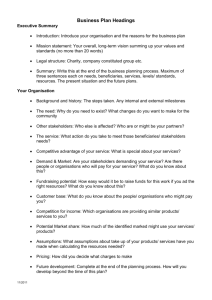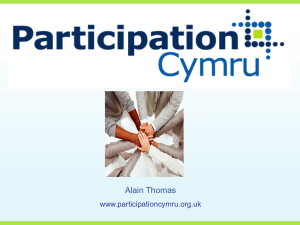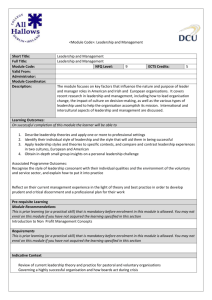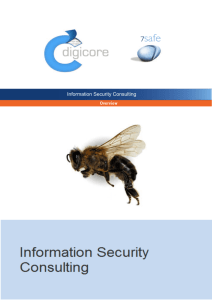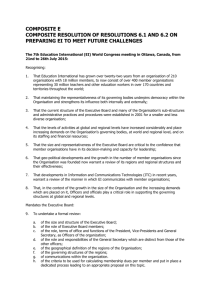Call for Evidence - Youth Sector Support Arrangements
advertisement
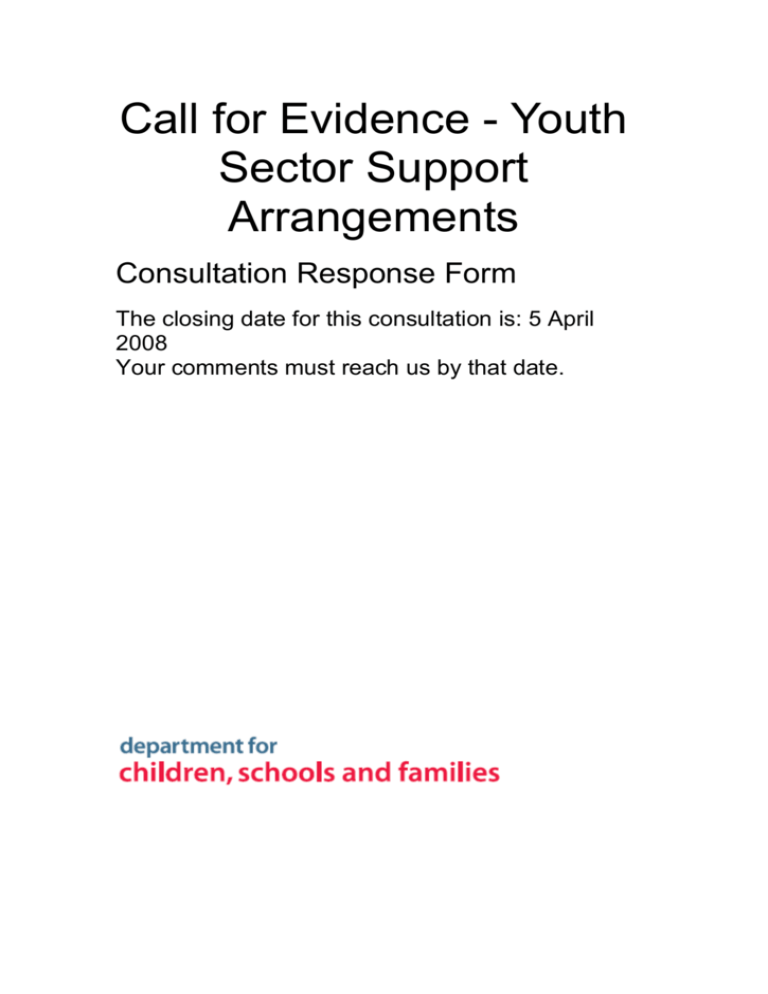
Call for Evidence - Youth Sector Support Arrangements Consultation Response Form The closing date for this consultation is: 5 April 2008 Your comments must reach us by that date. THIS FORM IS NOT INTERACTIVE. If you wish to respond electronically please use the online or offline response facility available on the Department for Children, Schools and Families e-consultation website (http://www.dcsf.gov.uk/consultations). The information you provide in your response will be subject to the Freedom of Information Act 2000 and Environmental Information Regulations, which allow public access to information held by the Department. This does not necessarily mean that your response can be made available to the public as there are exemptions relating to information provided in confidence and information to which the Data Protection Act 1998 applies. You may request confidentiality by ticking the box provided, but you should note that neither this, nor an automatically-generated e-mail confidentiality statement, will necessarily exclude the public right of access. Please tick if you want us to keep your response confidential. Name Organisation (if applicable) Address: If your enquiry is related to the policy content of the consultation you can contact Damon Boxer on: Telephone: 0114 259 3605 e-mail: damon.boxer@dcsf.gsi.gov.uk Responses There are more specific questions under each of the following headings. These are intended as a guide only so that submissions are focused on the key issues that DCSF is most interested in addressing as part of this consultation. We are particularly keen to receive propositions (both individual and joint) from partners about how sector support arrangements overall could be improved and what practical actions would need to be taken by Government – to secure coherent support for organisations from across statutory, third, and private sectors. Please tell us your job title Comments: Please choose from one of the following statements: I am responding on behalf of a public sector organisation / local authority I am responding on behalf of a forprofit organisation I am responding on behalf of a third sector organisation (see TOR) I am responding on behalf of a network, for example a national youth sector membership organisation or a local voluntary sector forum I am responding as an individual Other, please specify Please Specify: Please choose from one of the following statements: My work / the work of my organisation is focused solely on teenagers I / my organisation works with a range of clients, including teenagers I / my organisation does not work with teenagers, but they may be affected by my/our work (please specify) Other, please specify Please Specify: Are you / Is your organisation a member of any networks for example a national youth sector membership organisation or a local voluntary sector forum? Please list all applicable. Comments: Supporting regional and national partners 1) How could regional and national youth sector organisations work better together, and with Government, to enhance delivery and challenge underperformance in the youth sector? Points to consider in your response: Do you think current regional and/or national support arrangements are coherent and well coordinated? How effective are regional and/or national support arrangements at meeting the needs of professionals/organisations working with teenagers in your area? Do you think that underperformance is challenged effectively within the youth sector, and is this true regardless of what type of organisation is providing the service? Is there a need for rationalisation at regional and/or national level – to reduce the number of different associations / organisations/ authorities offering support to the youth sector? Comments: Supporting effective practice If we are to implement the reforms introduced by ‘Aiming high’, as well as to secure high quality, Integrated Youth Support Services (IYSS) in every local area, we need to be confident that all youth sector organisations can access information to help them in their work with young people; and to engage effectively with other professionals providing services for young people. 2) How would you improve support arrangements so that all youth sector organisations have equal access to: coherent, high quality information on practice; integrated working; and training opportunities? Points to consider in your response: How easy is it for you / your organisation to access the latest information about ‘best practice’ in working with young people? Do you feel there is sufficient support and guidance to help youth sector organisations engage effectively with other professionals providing services for young people? How easy is it for you / your organisation to access training and development opportunities? Is this information equally accessible to all parts of the youth sector, for example to: individuals; local authority youth services; private providers; voluntary groups and other third sector youth organisations? Comments: Improving local commissioning and assuring quality Local commissioning and growth To secure a high quality local offer for all young people, it will be vital that local children’s trust arrangements, in particular local commissioning arrangements, are robust enough to engage, and harness the capacity of individuals and youth organisations in the third and private sectors. The role of local authorities – and the practical help they receive to act as strategic commissioners of young people’s services – will be crucial in achieving this. It will be equally important to secure the sustainability of these providers, as well as, where appropriate, to promote and support their growth. 3) What improvements could be made to help youth sector organisations access local commissioning opportunities, and where applicable, to grow their business / organisation? Points to consider in your response: How easy is it for you / your organisation to understand and access local commissioning opportunities (such as contracts and grant funding)? What are the barriers to growth for youth sector organisations? What support could we offer Local Authorities to help them improve their commissioning practice, including helping them to engage with and support local third sector youth organisations? Comments: Quality Assurance 4) What improvements could be made to drive up and assure the quality of services for young people? Points to consider in your response: Is there a case for further regulation and what form could this take? What role should quality assurance and kite marking and award schemes play? How can we ensure more consistent standards of quality without creating barriers to smaller organisations? How can young people’s safety and ‘safeguarding’ issues be included within quality assurance arrangements? How should young people be involved? Comments: Promoting Private Sector and Personal Contributions It is clear that there are many individuals and businesses willing to invest expertise, resources and time to support local and national third sector youth organisations and projects. This can range from substantial financial investments in buildings or projects, to a commitment of a few hours a week to offer advice and support on finance, fundraising or project planning. Regardless of the scale of investment, it is always valued. Government believes there is potential to do more, through reform of youth sector support arrangements, to attract such investment to the youth sector, and match investors to projects. 5) How could support arrangements be improved so that third sector youth organisations can benefit from expertise, resources, and time offered by private individuals/organisations? Points to consider in your response: How easy is it for third sector organisations to access support from private individuals / organisations? Do you feel there is sufficient support to help individuals / organisations match their skills and resources to suitable third sector youth organisations? Comments: Empowerment: young people influencing services Programmes such as the Youth Opportunity Fund have demonstrated clearly the benefits of empowering young people to influence local decision making. New legislation requires local authorities to ascertain and take account of young people’s views on local positive activities and facilities and the Government has committed to extend the Youth Opportunity Fund until 2011. These are important steps, but Government is keen to go further by empowering young people to influence national policy, including decisions taken about a wider range of services which affect and interest them – such as environment, health and transport. 6) What would be the best way to help young people, particularly the most disadvantaged, influence policy making at national level? Points to consider in your response: How effective are mechanisms and organisations currently offering a voice to disadvantaged young people and/or those from minority groups? What more could these organisations do to secure that young people’s voices are heard? What role should be played by central Government departments? Comments: Thank you for taking the time to let us have your views. We do not intend to acknowledge individual responses unless you place an 'X' in the box below. Please acknowledge this reply Here at the Department for Children, Schools and Families we carry out our research on many different topics and consultations. As your views are valuable to us, would it be alright if we were to contact you again from time to time either for research or to send through consultation documents? Yes No All UK national public consultations are required to conform to the following standards: 1. Consult widely throughout the process, allowing a minimum of 12 weeks for written consultation at least once during the development of the policy. 2. Be clear about what your proposals are, who may be affected, what questions are being asked and the timescale for responses. 3. Ensure that your consultation is clear, concise and widely accessible. 4. Give feedback regarding the responses received and how the consultation process influenced the policy. 5. Monitor your department’s effectiveness at consultation, including through the use of a designated consultation co-ordinator. 6. Ensure your consultation follows better regulation best practice, including carrying out a Regulatory Impact Assessment if appropriate. Further information on the Code of Practice can be accessed through the Cabinet Office Website: http://www.cabinetoffice.gov.uk/regulation/consultationguidance/content/introduction/index.asp Thank you for taking time to respond to this consultation. Completed questionnaires and other responses should be sent to the address shown below by 9th April 2008 Send by post to: Damon Boxer Department for Children, Schools and Families E4B Moorfoot Sheffield S1 4PQ Send by e-mail to: YouthSectorSupport.CONSULTATION@dcsf.gsi.gov.uk


